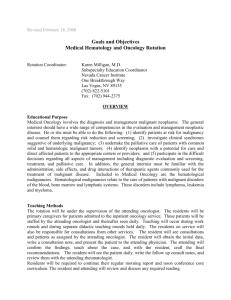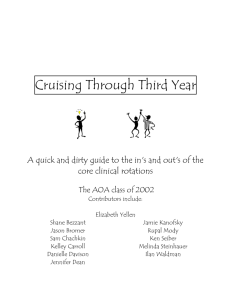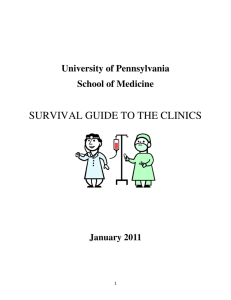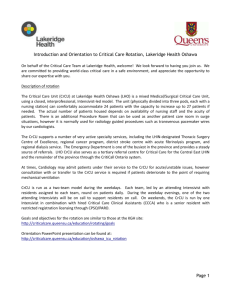Medical School Year 3 Advice & Toast
advertisement
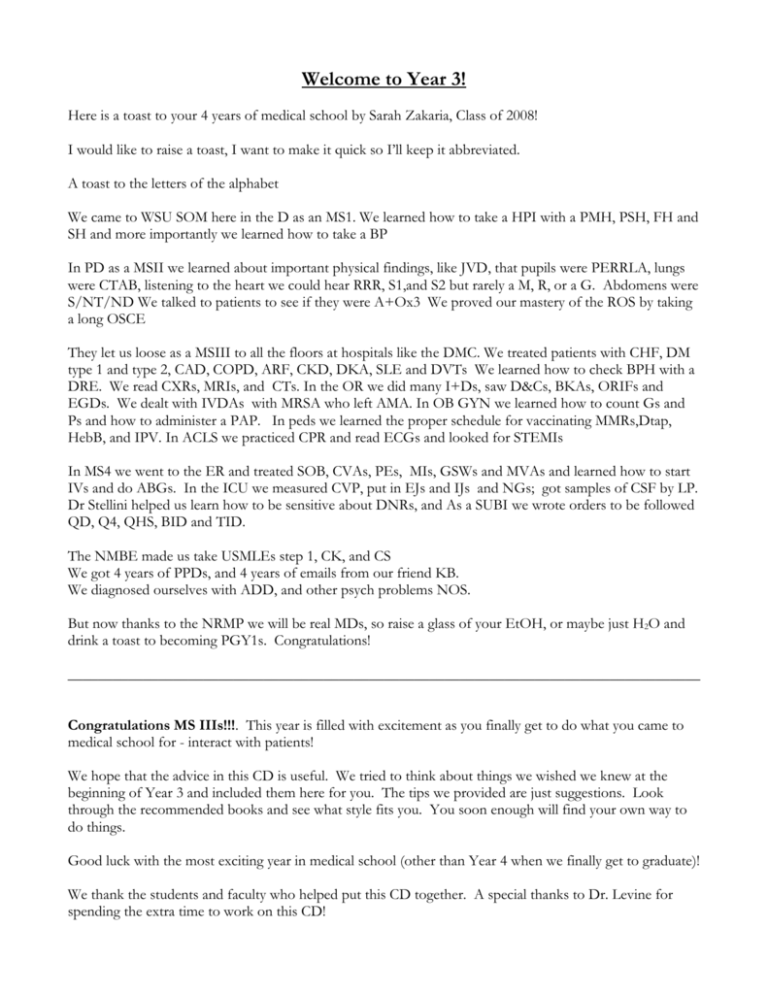
Welcome to Year 3! Here is a toast to your 4 years of medical school by Sarah Zakaria, Class of 2008! I would like to raise a toast, I want to make it quick so I’ll keep it abbreviated. A toast to the letters of the alphabet We came to WSU SOM here in the D as an MS1. We learned how to take a HPI with a PMH, PSH, FH and SH and more importantly we learned how to take a BP In PD as a MSII we learned about important physical findings, like JVD, that pupils were PERRLA, lungs were CTAB, listening to the heart we could hear RRR, S1,and S2 but rarely a M, R, or a G. Abdomens were S/NT/ND We talked to patients to see if they were A+Ox3 We proved our mastery of the ROS by taking a long OSCE They let us loose as a MSIII to all the floors at hospitals like the DMC. We treated patients with CHF, DM type 1 and type 2, CAD, COPD, ARF, CKD, DKA, SLE and DVTs We learned how to check BPH with a DRE. We read CXRs, MRIs, and CTs. In the OR we did many I+Ds, saw D&Cs, BKAs, ORIFs and EGDs. We dealt with IVDAs with MRSA who left AMA. In OB GYN we learned how to count Gs and Ps and how to administer a PAP. In peds we learned the proper schedule for vaccinating MMRs,Dtap, HebB, and IPV. In ACLS we practiced CPR and read ECGs and looked for STEMIs In MS4 we went to the ER and treated SOB, CVAs, PEs, MIs, GSWs and MVAs and learned how to start IVs and do ABGs. In the ICU we measured CVP, put in EJs and IJs and NGs; got samples of CSF by LP. Dr Stellini helped us learn how to be sensitive about DNRs, and As a SUBI we wrote orders to be followed QD, Q4, QHS, BID and TID. The NMBE made us take USMLEs step 1, CK, and CS We got 4 years of PPDs, and 4 years of emails from our friend KB. We diagnosed ourselves with ADD, and other psych problems NOS. But now thanks to the NRMP we will be real MDs, so raise a glass of your EtOH, or maybe just H2O and drink a toast to becoming PGY1s. Congratulations! ____________________________________________________________________________________ Congratulations MS IIIs!!!. This year is filled with excitement as you finally get to do what you came to medical school for - interact with patients! We hope that the advice in this CD is useful. We tried to think about things we wished we knew at the beginning of Year 3 and included them here for you. The tips we provided are just suggestions. Look through the recommended books and see what style fits you. You soon enough will find your own way to do things. Good luck with the most exciting year in medical school (other than Year 4 when we finally get to graduate)! We thank the students and faculty who helped put this CD together. A special thanks to Dr. Levine for spending the extra time to work on this CD! General Advice from Students ***“Stick around at least until 5:00. If your resident says that you can go home around 1:00, DO NOT LEAVE! Find a place to study around there so that if your attending pages you, you can answer. Too many times have attendings been disappointed that a particular student was nowhere to be found.” “Sleep as much as you are able to! Those days that I didn’t get enough sleep were a complete wash and I didn’t learn anything.” “Comfortable shoes are a must.” “Be on time! Trust me – everybody knows if you are late!” “Always be prepared and on time for rounds.” “Practice presenting your patient, especially the first few times, with a resident.” “Every team has different dynamics, and every attending has a different rounding style. Some attendings love to have students and residents ask questions on rounds. Others are more formal with their teaching and do not like to hear students on rounds. Use the first few days of the rotation to gauge the team dynamics.” “Be a team player – don’t sit back and watch. If a resident needs a chart, help look for it.” “While on the floors it is always good to ask how you can help the team, be it through writing discharge paperwork, doing small procedures, or changing bandages. Showing initiative and a desire to be a part of the team goes a long way when it comes to evals.” “Professionalism and enthusiasm are key. Knowing the correct answer to every question is not what you’re evaluated on. Showing interest and enthusiasm about getting to the right answer is what counts.” “You spend a LOT of your time in any rotation… do not try to take shortcuts. We as students CAN make a big difference in patient care because we have very few patients assigned to us and a LOT of time (relatively). So, take the time to get to know your patients. It will work in your best interest.” “Know everything possible about your patients. Take a detailed history. Do a thorough exam. Keep tabs on the pertinent lab values, tests, vitals, etc. Try to read the X-ray, MRI, CT, and other imaging studies before looking at the report from the radiologist.” “Follow your patients. For example, if you are on the surgery rotation and your patient needs a surgery by ENT or plastics, ask if you can scrub in. One of my best experiences was when I scrubbed in on a plastics case with my general surgery patient. If you are on the internal medicine service and your patient is getting a colonoscopy and you have never seen one, ask to go observe.” “If you don't like the rotation you are on, take whatever you can from it and know that's not what you will do the rest of your life. Try to learn. It is possibly your only chance to talk to someone about suicide, deliver a baby into this world, touch a real live liver! Just keep it in perspective and take away as much as you can.” “Do every procedure offered to you, even if you have never seen it done before because you always think you will have other opportunities to do it again, but won’t. And tag along with residents instead of reading in a room somewhere. You will learn a lot about how the hospital functions this way.” “My best advice, ask questions, be friendly, show that you're interested to your team and most importantly your patients. Look things up when you don't know the answer and then share your findings with someone senior to you so you can talk about it. This shows you are self-sufficient but want to know more.” “The best piece of advice I got was to go up to the attendings/residents and ask for feedback (like midterm evals or last day of rotation, etc.). This shows interest and a desire for self-improvement. It might be intimidating at first, but I have never had an attending tell me off. It always has reflected positively. If they tell you to improve something, show them that you are working on it with your actions. Do not keep going back to them to see if they feel you have improved yet!” “For the more shy/quiet students out there: We can do it! You know your strengths and talking or being more visible may not be one of them. It is OK for the most part, but sometimes things get really busy or the team has more outspoken students. Especially for these circumstances, I found that it is important to push myself to speak up to show that I was thinking and processing. It does not matter if we are wrong as long as our thought process is logical and we stay teach-able!” “Picking smaller teams and sites where you can work one-on-one with the attending/resident can help (ex. Peds outpatient at HFHS Detroit vs. GPC at CHM). Seeking feedback, doing oral presentations, standing/sitting closer to the attending during rounds to be audible can all help. “Be yourself and care about your patients. Make your patients your priority and not impressing others and this will be a) more rewarding, b) less stressful, and c) more impressive (residents and attendings take note of this - the patient’s care is their priority too).” “Try to be interested even if you're not thinking about going into the field. There are ways to relate the rotation to your own interests, and that is all that is needed. I don't think you need to claim to want to go into each rotation's field, but you can say "I'm interested in ----- as of now, but I am keeping an open mind. In the meantime, I would love to learn about ---- while on the rotation here." Try to be as involved as possible, and be seen being involved. Jump on opportunities to observe/perform procedures and always be open to residents imparting their wisdom. They have a lot to teach, and it is great when they take their time to further our education.” “Since most of your time will be spent with interns, make it a point to make their lives easier and in return, I believe you will get more teaching from them. Try to be conscious of the team environment during your rotations. Do not show up your fellow students on rounds to make yourself look like a star. Wait until the attending asks if anyone else knows the answer and then answer gracefully. And it is much much worse if you try to show up someone that is higher on the totem pole. If you get the opportunity to make your intern look better on rounds, take it. Be nice to the nurses. They know how to get things done.” “Help your classmates. You will need their help, trust me!” “Find an organized way of keeping track of the pearls of wisdom. You may never hear things explained in such a way that makes quite that much sense to you (i.e. a great EKG lecture), and you may want to pull it out as a reference in other rotations/residency. Consider purchasing a notebook of index cards and file appropriate information in one of the cases for index cards.” “Make sure you are always managing the most interesting patient on your team (even if not your intern's patient). Nobody will ever fault you for wanting to learn more.” “ Learn early on what is appropriate for you to look up vs ask your resident vs ask your attending; only ask your attending intelligent and informed questions after you have read about a topic.” “Lectures are a really great way to integrate info, especially on busy services when reading time is limited. Keep useful lectures in a place that is readily accessible and bring coffee.” “When starting any new rotation, look at other notes/discharge summaries in the chart and model your notes accordingly. Ask questions if you need to, but also try to be an independent learner. When looking t/notes before a patient is admitted, always look at all ER notes, notes from ppl w/in the field you are rotating t/, radiology, most recent labs, and discharge summaries.” “You should read about every patient on your team's service and be prepared to talk intelligently. It's the best way to learn!!” “Find an organized way to keep track of day to day changes w/your patient (index cards, running list, medfools)” “Do NOT take things personally from residents, docs, other members of the team. They don't go home thinking about you. If you get yelled at, learn from it and never make that mistake again, but move on.” “Always do more than what is asked of you...if they tell you to manage 2 patients, you should have 4 patients (even if it means you are getting there earlier). Offer to do morning admissions. Offer to take care of all aspects of care involved w/your patient (even if it is asking the nurse if you can put a Foley in..it's a great way to learn!), including notes. You learn a ton by challenging yourself this way.” “What was hardest for me at the beginning of third year was how to come up w/differentials: info from 2nd yr may be a mish mosh at the beginning of third year. Come up w/your differential on your own w/INVICTOE for each organ system. Then Up to Date chief complaints/sxs and see what you may have missed. 3rd yr is the beginning of more independent learning, and I consolidated a lot of info this way.” “I was part of the clinical campus model this past year, and thought that it was great. There are definitely pros/cons, just like rotating through multiple hospitals. A really big thing that I noticed though is that since you work with the same 10 students all yr, sometimes personalities will rub each other the wrong way. This seems like silly advice, but do NOT talk about your fellow med students w/other med students in your group. You are just asking for needless drama. Vent to your dog.” When preparing a presentation on a topic for your team, use the mnemonic: “Down in Australia poor people drink wine in tin cans.” Down: Definition In: Incidence/Epidemiology Australia: Aetiology Poor: Physiology/Pathophysiology People: Presentation (clinical features) Drink: Differential Wine: Work-Up (specific exams, labs, imaging) (in) Tin: Treatment Cans: Complications Advice about Balancing the Rotation and Studying “You learn the best and you learn the most while you are taking care of patients. Read about your patients, read about other people’s patients, examine every patient you can, and ask questions. Actually doing things actively is the best way to make knowledge stick. Also, you can answer questions about your patient’s disease process during rounds while still studying for the SHELF. Print off an article from Up-To-Date or carry a small reference book and read it during downtime.” ***“When studying cases for the SHELF, ask yourself, what is the next best step in management? This is a very popular question on every SHELF. It can throw you off because you study how to diagnose a disease and to treat a disease, but may not realize there is a particular order of steps to take in order to do so. Doing practice questions and cases can help you practice answering this.” “You will be surprised to learn about how much downtime you will be faced with. If I could do it over again, I would make an effort to be more productive during those times. After I started to get the hang of the rhythm of a rotation and when the down time occurred, I’d ask the residents/interns if there was anything I could help with or if anything interesting is going on. If not, I would go read and ask them to page me if anything came up.” “Read an hour a day consistently throughout the month. Do not cram. Read about your patients in the afternoons at the hospital after rounds on Up-To-Date.” “Do practice questions EVERY night.” (Many students have recommended this.) “Read intensely during the first half of the rotation and do lots of questions during the second half making notes all along. And then the week of the exam review notes and important/weak topics.” “You will feel exhausted after coming home. Go to bed early and wake up early and read if you could not get any reading done the previous evening. Try not to get in the habit of thinking that you’ll just read twice as much the next day. Trust me, you will tell yourself the same thing the next day.” “This year is really about efficiency. Try to learn as much as you can while at the hospital/clinical. It is that much less that you have to do when you go home that night.” “If you are on call for the weekend, take advantage of the “down” times and study. You can get the best reading time in on these weekends!” “For the 1 month rotations, try to be on top of things. The month goes by very quickly, especially if you got used to 2 month rotations already.” “If you don’t know, ask as soon as you have a question. Waiting to go home to look everything up is just not practical. Also, oftentimes residents love to teach, especially the senior residents on the team. At the same time, don’t take anyone’s word for it either!” “Keep doing what you did in first and second year. Keep exercising. Take time off to see family and friends. Reading everyday really beats trying to cram right before a SHELF. I cannot stress that enough.” “Pay attention during lectures. They are often very relevant to the shelf exams..” Taking the SHELF Exams The SHELF exams each have 100 Q’s and you have 2h 10min. to take it. The pace is brisk and the vignettes are often long, so make sure you keep pace throughout. It stinks to have to fill out “C” for the last however many questions you didn’t get to. But it if that happens, don’t sweat it too bad. It usually happens to people early in the year when the averages will be low and everyone else will be having just as hard of a time. Most of the questions are the standard multiple choice. However, there are a set of questions at the very end of the test that are matching. There are more answer choices than questions, so they may take a bit longer to look through. Many students suggest either starting at the end of the test and then coming back to the beginning or jumping to the end somewhere in the middle of the test to complete these questions. Often students have felt that the questions towards the end seemed easier, it’s just that they didn’t have enough time to get to them. This is just something to consider. Also, most rotations have a review session at the end, and for the most part these are really helpful for the shelf. Try and attend. Helpful General Resources - 250 Biggest Mistakes Medical Students Make: YOU WILL BE GIVEN ONE AT ORIENTATION! - Maxwell’s: YOU WILL BE GIVEN ONE AT ORIENTATION! - Tarascon’s Pharmacopoeia - MicroMedex (through DMC’s Citrix): handy for pharm to look up drug interactions, side effects, contraindications - Sabatine Pocket Medicine: quick reference for many, many diseases - Medicine Pocketbook from Mass General: useful for all rotations - Up To Date: can be found through Shiffman Library (vpn.med.wayne.edu); great reference to read up on topics - USMLEWorld QBank for Step 2 CK (online): highly recommended by several students. It is a great question source for SHELF exams and for Step 2. - If you already bought a PDA, use it! Take it to the PDA Support at school and they can help load quick reference guides. Epocrates is a quick source for medication information as well as quick diagnosis reference while on rounds. Saving $$$ On Year 3 Books: The AMSA Used Book Sale is a great place to look for cheaper books. Also, if you know people who are in other blocks you can consider rotating books amongst each other. And When You Feel Like You’d Rather be a Lawyer… “Enjoy taking care of your patients. We are blessed with being the lucky ones who get to do this for a career. It's very exhausting and sometimes you'll wonder what in the world you are doing to yourself, but try to remember the big picture. There are people who need us to become good doctors so do it for them and for yourself. If you do a good job, you will have rewarding moments throughout the year. Take time to feel good and smile when they come along.” “Hands down, the patients are what makes 3rd year. Whenever you feel like “just a med student”, check in with your patients. It will make you day!” “Make sure you always make time to do the things you want to do, like hanging out with family and friends. Actively set aside time to do this. Exercise and eat well. This will help you keep in touch with reality.” “You will inevitably see people on your team interact with patients in a way that will make you flinch. Everyone feels a little jaded after a while. It helps a lot to really try and picture how the patient ended up that way...sure he/she may be drug-seeking, but what awful things did they go t/to make him/her that way? 3rd yr is a really great time to be introspective and grateful. We are part of people’s best/worst memories, and we get to help so many people that we would never get to even meet in any other profession.. Try not to forget why you decided to go to med school.”
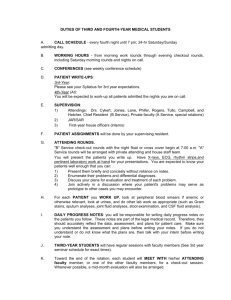
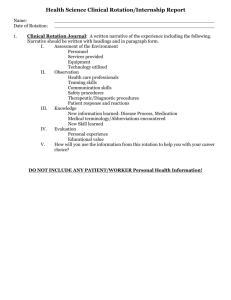



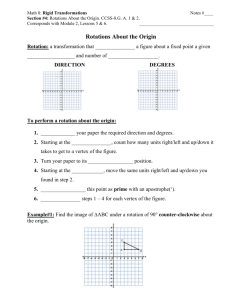
![ADP Graduate Advert [13]](http://s3.studylib.net/store/data/007042542_2-f5c31f40e7b460922889c74736930ea4-300x300.png)
